Renault Scénic vs Skoda Elroq - Differences and prices compared
Compare performance (218 HP vs 340 HP), boot space and price (34600 £ vs 29100 £ ) at a glance. Find out which car is the better choice for you – Renault Scénic or Skoda Elroq?
Costs and Efficiency:
Looking at overall running costs, both models reveal some interesting differences in everyday economy.
Skoda Elroq has a a bit advantage in terms of price – it starts at 29100 £ , while the Renault Scénic costs 34600 £ . That’s a price difference of around 5571 £.
In terms of energy consumption, the advantage goes to the Skoda Elroq: with 15.20 kWh per 100 km, it’s barely noticeable more efficient than the Renault Scénic with 16.60 kWh. That’s a difference of about 1.40 kWh.
As for electric range, the Renault Scénic performs hardly perceptible better – achieving up to 598 km, about 25 km more than the Skoda Elroq.
Engine and Performance:
Under the bonnet, it becomes clear which model is tuned for sportiness and which one takes the lead when you hit the accelerator.
When it comes to engine power, the Skoda Elroq has a noticeable edge – offering 340 HP compared to 218 HP. That’s roughly 122 HP more horsepower.
In acceleration from 0 to 100 km/h, the Skoda Elroq is clearly quicker – completing the sprint in 5.40 s, while the Renault Scénic takes 7.90 s. That’s about 2.50 s faster.
In terms of top speed, the Skoda Elroq performs slight better – reaching 180 km/h, while the Renault Scénic tops out at 170 km/h. The difference is around 10 km/h.
There’s also a difference in torque: Skoda Elroq pulls convincingly stronger with 679 Nm compared to 300 Nm. That’s about 379 Nm difference.
Space and Everyday Use:
Cabin size, boot volume and payload all play a role in everyday practicality. Here, comfort and flexibility make the difference.
Both vehicles offer seating for 5 people.
In curb weight, Renault Scénic is barely noticeable lighter – 1822 kg compared to 1953 kg. The difference is around 131 kg.
In terms of boot space, the Renault Scénic offers to a small extent more room – 545 L compared to 470 L. That’s a difference of about 75 L.
In maximum load capacity, the Renault Scénic performs barely noticeable better – up to 1670 L, which is about 90 L more than the Skoda Elroq.
When it comes to payload, Skoda Elroq barely noticeable takes the win – 531 kg compared to 518 kg. That’s a difference of about 13 kg.
Who comes out on top?
Overall, the Skoda Elroq shows itself to be outperforms in nearly all aspects and secures the title of DriveDuel Champion.
It convinces with the more balanced overall package and proves to be the more versatile choice for everyday use.
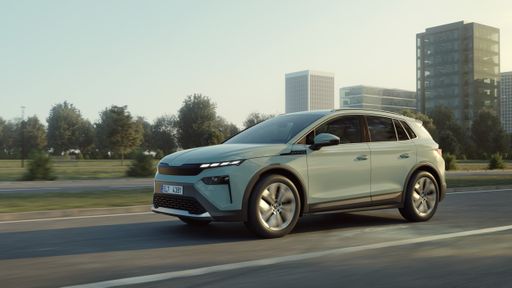
Skoda Elroq
Costs and Consumption
View detailed analysis
Engine and Performance
View detailed analysis
Dimensions and Body
View detailed analysis
Renault Scénic
The Renault Scénic is a quietly clever family MPV that balances everyday practicality with unexpected flair, offering a roomy, flexible cabin that makes school runs and weekend escapes less of a chore. It won't dazzle like a sports car, but its composed ride, sensible tech and thoughtful storage solutions make it a superbly pragmatic choice for buyers who prefer substance with a wink.
details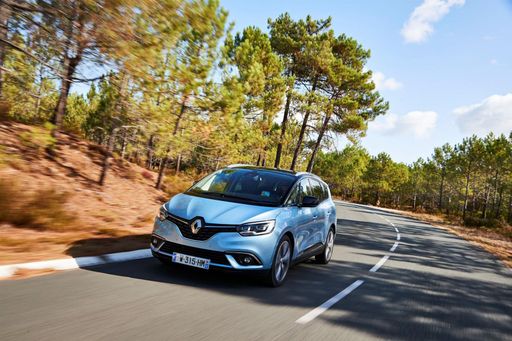
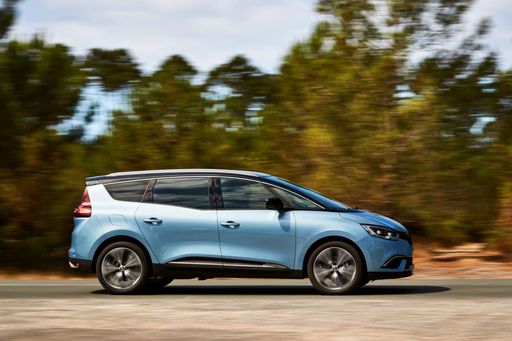
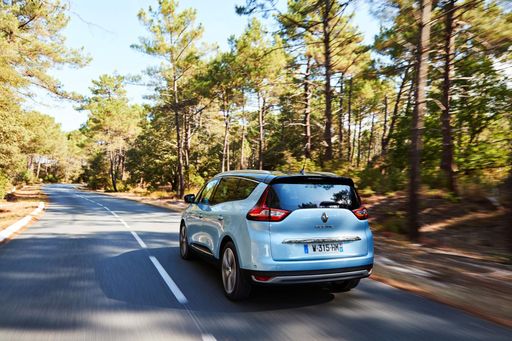
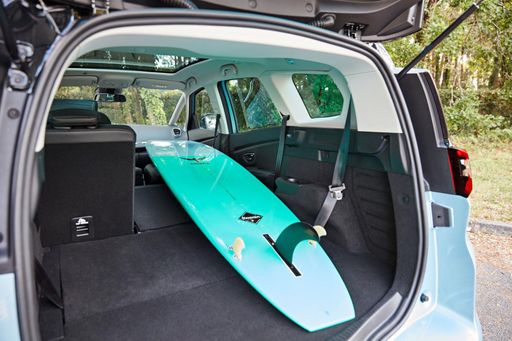
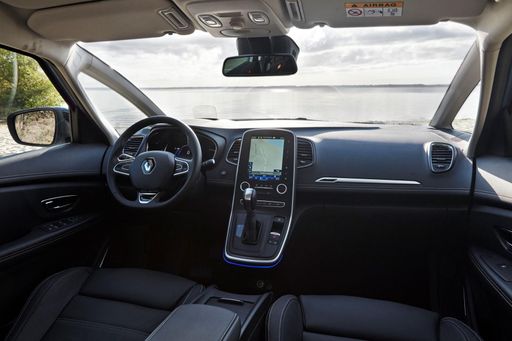
Skoda Elroq
The Skoda Elroq is a cleverly packaged family SUV that mixes roomy practicality with sharp, modern looks, making it an easy pick for buyers who prefer common sense over flash. On the road it's composed and user-friendly, with thoughtful interior details that turn everyday driving into something pleasantly efficient — a sensible companion with a wink.
details
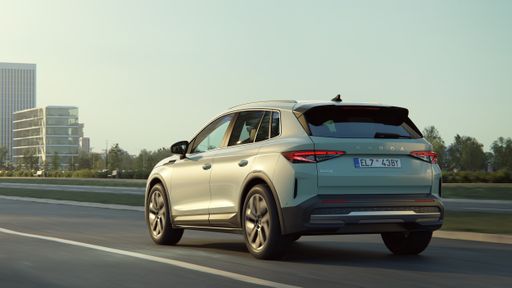
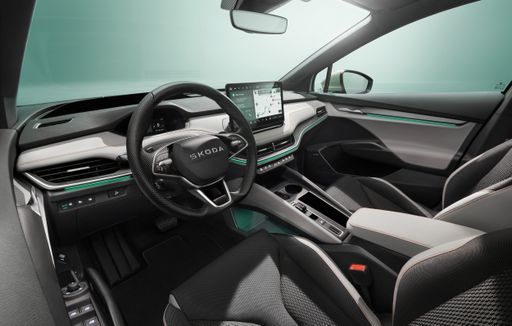
Costs and Consumption |
|
|---|---|
|
Price
34600 - 44000 £
|
Price
29100 - 45500 £
|
|
Consumption L/100km
-
|
Consumption L/100km
-
|
|
Consumption kWh/100km
16.6 - 17.5 kWh
|
Consumption kWh/100km
15.2 - 16.5 kWh
|
|
Electric Range
420 - 598 km
|
Electric Range
377 - 573 km
|
|
Battery Capacity
-
|
Battery Capacity
52 - 79 kWh
|
|
co2
0 g/km
|
co2
0 g/km
|
|
Fuel tank capacity
-
|
Fuel tank capacity
-
|
Dimensions and Body |
|
|---|---|
|
Body Type
SUV
|
Body Type
SUV
|
|
Seats
5
|
Seats
5
|
|
Doors
5
|
Doors
5
|
|
Curb weight
1822 - 1927 kg
|
Curb weight
1953 - 2268 kg
|
|
Trunk capacity
545 L
|
Trunk capacity
470 L
|
|
Length
4470 mm
|
Length
4488 mm
|
|
Width
1864 mm
|
Width
1884 mm
|
|
Height
1571 mm
|
Height
1608 - 1625 mm
|
|
Max trunk capacity
1670 L
|
Max trunk capacity
1580 L
|
|
Payload
514 - 518 kg
|
Payload
470 - 531 kg
|
Engine and Performance |
|
|---|---|
|
Engine Type
Electric
|
Engine Type
Electric
|
|
Transmission
Automatic
|
Transmission
Automatic
|
|
Transmission Detail
Reduction Gearbox
|
Transmission Detail
Reduction Gearbox
|
|
Drive Type
Front-Wheel Drive
|
Drive Type
Rear-Wheel Drive, All-Wheel Drive
|
|
Power HP
170 - 218 HP
|
Power HP
170 - 340 HP
|
|
Acceleration 0-100km/h
7.9 - 8.6 s
|
Acceleration 0-100km/h
5.4 - 9 s
|
|
Max Speed
150 - 170 km/h
|
Max Speed
160 - 180 km/h
|
|
Torque
280 - 300 Nm
|
Torque
310 - 679 Nm
|
|
Number of Cylinders
-
|
Number of Cylinders
-
|
|
Power kW
125 - 160 kW
|
Power kW
125 - 250 kW
|
|
Engine capacity
-
|
Engine capacity
-
|
General |
|
|---|---|
|
Model Year
2025
|
Model Year
2025
|
|
CO2 Efficiency Class
A
|
CO2 Efficiency Class
A
|
|
Brand
Renault
|
Brand
Skoda
|
What drive types are available for the Renault Scénic?
Available configurations include Front-Wheel Drive.




